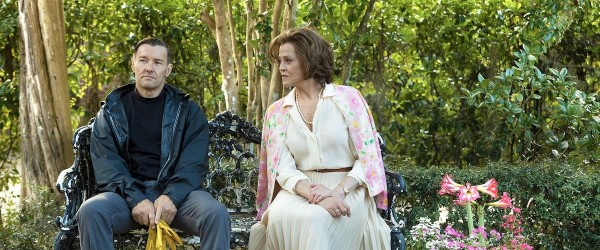-
MASTER GARDENER (Paul Schrader 2022)
PAUL SCHRADER: THE MASTER GARDENER (2022)

JOEL EGERTON AND SIGOURNEY WEAVER
Familiar ground
There's a certain danger for reviewers to write about this film as part of a trilogy and not look at it too closely for itself. It's certainly a must for fans of the writer-director who've seen the much admired First Reformed and the less so Card Counter. (For the record I admired the second just as much as the first, and enjoyed it considerably more.) They're all about tormented and "lonely" men who are looking for expiation and revenge for a burdensome past, Ethan Hawke's Toller in an old church, Oscar Isaac's Tillich in a succession of gambling casinos, now Joel Egerton's Narvel Roth as chief horticulturalist of the ancestral garden of a southern mansion. All three actors give terrific performances. Egerton is so tightly wound you tense up watching him.
Norvel, as cunningly crafted by Egerton, is great as a singular object. But the last prong of the trilogy doesn't work as well as either of its two predecessors. One trouble is that by now there is more to the trilogy than there is to this film. This despite Sigourney Weaver's being terrifyingly off-putting as Roth's boss lady-mistress, Miss Haverhill (or Norma), and Quintessa Swindell being beguiling as Maya, the young biracial woman, Norma's grandniece brought in as a gardening trainee by Norma's command and soon very close to Norvel. Queen, knave, pawn? These seem like chess pieces, the grand colonial mansion and its grounds like the board, the action magnificently assured but artificial, the finale murky, like much of the photography of the dp for the whole trilogy,Alexander Dynan. Why must the scenes, except for some tacked-on shots of flowers in bloom, be so dark? And while we're at it, why must each protagonist in the trilogy wind up seated at a desk tormentedly writing into a journal every single night? Does Schrader get to be as mannered and repetitious as Bresson? There's a risk of self-parody here. I understand there was laughter when the first tormented-journal-writing shot came on screen at the New York Film Festival.
There's still plenty of excitement in Master Gardener. Norvel seems about to explode, Norma is haughty and sexy, and we begin to see what's going on when Norvel takes his shirt off and reveals a perfectly sculpted torso covered over with beautifully executed fascist tattoos. Yes, he's a recovering racist (and we actually dip into a 12-step meeting) - though I, at least, never quite got what his special relation with his parole officer was or what he actually has done. Instead, we get constantly lectured in voiceover by Norvel about the history of gardening, which is boring and repetitious and feels like filler. Whatever Schrader's relation to horticulture (or not) he makes it seem a tacked-on element here, whether Norvel is teaching his pupils to snort loam to get the ancestral feel of soil or brandishing stem-clippers menacingly at poor white southern baddies. But there is tension, every time Norvel climbs up on Norma's palatial porch and pets her family pooch, or sits down for lunch with Maya. Eventually there will be the obligatory violence, and also retaliation, redemption, and love. But though Egerton is utterly convincing as a fierce repressed personality the writing doesn't work out Norvel's sin and salvation with enough diligence and at the end there wasn't, for me, enough emotion, or enough that felt real going on.
Master Gardener, 111 mins., debuted at Venice Sept. 3, 2022 and showed next month in the Main Slate at the NYFF, featuring also in two dozen other international festivals. Limited US theatrical release began May 19, 2023. Metacritic rating: 63%
 Posting Permissions
Posting Permissions
- You may not post new threads
- You may not post replies
- You may not post attachments
- You may not edit your posts
-
Forum Rules





 Reply With Quote
Reply With Quote
Bookmarks